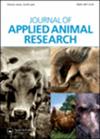梭状芽胞杆菌:一种来自瘤胃微生物组的新型纤维分解原生菌株,可提高中央农业残留物的体外消化率
IF 1.9
4区 农林科学
Q3 AGRICULTURE, DAIRY & ANIMAL SCIENCE
引用次数: 0
摘要
本文章由计算机程序翻译,如有差异,请以英文原文为准。
Lysinibacillus fusiformis : a novel fibrolytic native strain from the rumen microbiome that increases in vitro digestibility of central agricultural residues
ABSTRACT Increasing the digestibility of agricultural residues is one goal of sustainable livestock production, and the role of rumen microbiome-feed interaction is critical for efficient digestion. This study was aimed at isolating and evaluating in vitro the effect on dry-matter digestibility (IVDMD), relative feed values (RFV), volatile fatty acid (VFA) synthesis, pH changes, and gas production (GP) by the inclusion of native rumen strains in mixtures of corn, sorghum, and oat agricultural residues with ruminal fluid. The results show that an inoculum of 1 × 1010 colony-forming unit per millilitre (CFU/mL) of the aero-tolerant native rumen strain Lysinibacillus fusiformis increases the IVDMD, RFV, and VFA values of all mixtures. During agricultural residue fermentation, the pH was stable, and propionic acid was the primary fatty acid synthesized, indicating increased energy availability for efficient cattle growth performance while limiting molecular hydrogen (H2) synthesis for conversion to methane (CH4). These results suggest that L. fusiformis could be used as a direct-feed microbial to promote sustainable livestock production. To the best of our knowledge, this is the first report to link the fermentation of fibrous agricultural residues in ruminal fluid inoculated with a fibrolytic native strain and digestibility in favour of increasing the efficiency of livestock production.
求助全文
通过发布文献求助,成功后即可免费获取论文全文。
去求助
来源期刊

Journal of Applied Animal Research
农林科学-奶制品与动物科学
CiteScore
2.70
自引率
0.00%
发文量
80
审稿时长
6 months
期刊介绍:
Journal of Applied Animal Research (JAAR) is an international open access journal. JAAR publishes articles related to animal production and fundamental aspects of genetics, nutrition, physiology, reproduction, immunology, pathology and animal products. Papers on cows and dairy cattle, small ruminants, horses, pigs and companion animals are very welcome, as well as research involving other farm animals, aquatic and wildlife species. In addition, manuscripts involving research in other species that is directly related to animal production will be considered for publication.
 求助内容:
求助内容: 应助结果提醒方式:
应助结果提醒方式:


